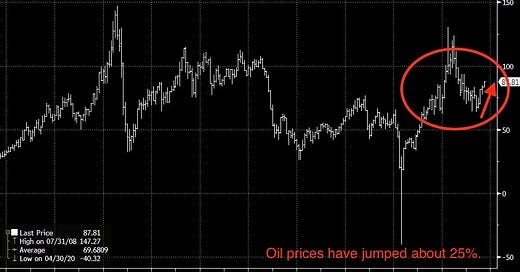“In the late 1970s, the average American adult male weighed 173 pounds. Now the average American man tips the scale at nearly 200 pounds…’average’ is not necessarily optimal.”
Outlive, Peter Attia and Bill Gifford
“My calculations show a 60-fold increase in the use of fossil fuels during the 19th century, a 16-fold gain during the 20th century, and about a 1,500-fold increase over the past 220 years.”
How the World Really Works, Vaclav Smil
Markets are a lens to understand the world and a force unto themselves that is powerful enough to break or at least meaningfully disrupt existing structures. That’s why it is useful to track what they are doing, whether you trade markets for a living or are merely trying to make sense of the world. Oil is catching my attention now because the price is rising at a time when economic growth is slowing, which is unusual and has significant implications for inflation and international relations.
Oil is a market unto itself but also a key input into the price of a bond because oil price changes directly feed into inflation, which then feeds through to the price of money. The yield on a bond is the “real” yield plus compensation for inflation, so the higher inflation goes the higher the yield should go. The yield on the bond is the discount rate applied to both stocks and real estate. It is indeed all connected, the arm bone connected to the leg bone.
I don’t always utilize an outright oil exposure in my asset allocation, but I keep an eye on the price, which is up about 25% in recent weeks.
Oil also plays a critical geo-strategic role. The Soviet Union’s collapse was in part visualized by Harvard Professor Richard Pipes who told President Reagan that if the Saudis pumped more oil (back when the Saudis listened to Washington) and the US spent more on defense spending, the Soviet Union would see its revenues (oil) fall and its expenses (keeping up with the US) rise, leading to a political crisis. Today it looks like a combo of Biden using the US strategic petroleum reserve and offending Riyadh may be causing a supply shift that will ripple through to central bank policy and asset pricing and makes containing Russia more difficult.





